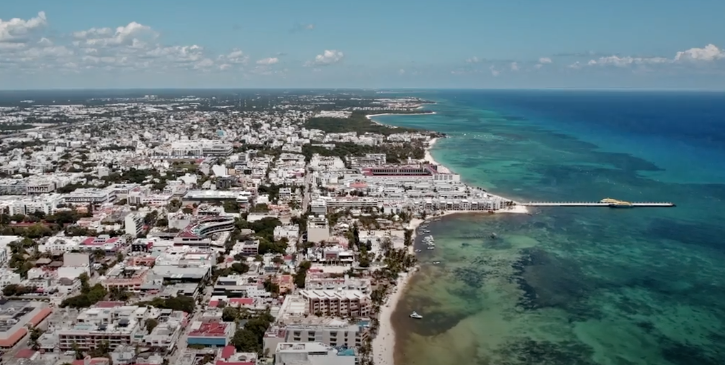Moving to Mexico in 2024: Top Tips for a Smooth Relocation

The Ultimate 2024 Guide to Relocate to Mexico
Mexico offers expats an affordable lifestyle, beautiful landscapes, and a welcoming culture. Whether you’re seeking a retirement haven, a vibrant expat community, or new career opportunities, Mexico has a range of options for every lifestyle. This guide covers the essentials you need to know for a smooth relocation, including residency options, healthcare, job opportunities, popular destinations, and legal considerations. And, you can learn Spanish and blend in with the locals!
You will likely have many questions about the process, reach out to one of the Relocation Experts at Mycasa Real Estate for professional advice every step of the way.
Table of Contents
-
-
Temporary and Permanent Visas
-
-
-
Important Documents
-
Healthcare
-
Importing Pets
-
-
-
Tulum, Playa del Carmen, Cancun, Puerto Aventuras, Merida
-
-
Residency Options in Mexico: Do you need a visa?

Visa Requirements to Move to Mexico
-
Visa Necessity: Required for long-term moves; tourists can stay up to 180 days without a visa.
-
Types of Visas: Options include temporary and permanent resident visas for various purposes.
-
Application for Family Reunification: Must be initiated by a family member in Mexico through the National Immigration Institute.
Temporary Resident Visa
-
Duration and Application: Valid for 180 days to four years; apply at Mexico’s National Immigration Institute with necessary documents (passport, proof of financial stability, etc.).
-
Financial Requirement: Monthly income of about $4,150 or property ownership over $553,000.
-
Work Restriction: Does not permit work in Mexico.
Permanent Resident Visa
-
Eligibility: Requires 4 years as a temporary resident, or 2 years if married to a Mexican citizen.
-
Financial Requirement: Approximately $7,200 in monthly income.
-
Benefits: Allows work and access to social services; ideal for long-term relocation.
-

Preparing for Your Move
Important Documents
-
Passport and Visa: A valid passport is required for entry; visas depend on stay duration and purpose.
-
Proof of Income: Needed to meet financial requirements for most visa types.
-
Other Documents: Birth and marriage certificates may be necessary for legal processes in Mexico.
Health Insurance
-
Local vs. International Plans: Local health insurance is more affordable; private plans provide broader access.
-
IMSS System: Public option but limited facilities and potential medication shortages.
-
Private health Insurance for Seniors: May have age limits and restrictions on pre-existing conditions.
Importing Pets
-
Health Certificate: Not required for pets from the U.S. or Canada.
-
Transport Requirements: Clean carrier, free from bedding or toys.
-
Pet Limits: Up to two pets allowed without additional paperwork; fees apply for extra pets.
Financial Planning for Your Move

-
Importance: Essential for maintaining your lifestyle and managing moving expenses.
-
Benefits: Many expats enjoy a lower cost of living in Mexico while maintaining or improving quality of life.
Monthly Income Requirements
-
Permanent Residency: Requires monthly income of $5,800–$7,800 or savings of $231,000–$300,000.
-
Temporary Residency: Can qualify through proof of income, savings, or property investment.
-
Minimum Wage Standard: Daily minimum wage of MXN $208 helps assess financial solvency for visas.
Living Costs in Mexico
-
Housing Costs: One-bedroom apartments near the beach start around $600/month; central city apartments average MXN $12,162.59.
-
Monthly Expenses: Average costs for a single person are approximately MXN $12,444.9, excluding rent.
-
Rental Variability: Airbnb rentals are 30-50% more expensive than long-term leases, with prices differing by region.
Tips to Save on Relocation
-
Relocation Costs: Moving from the U.S. to Mexico can range from $5,000–$10,000.
-
Cost-Saving Tips: Pack light, buy essentials locally, and avoid imported goods.
-
Seasonal Savings: Move during off-season, compare movers, and consider selling or donating unneeded items.

Working and Earning in Mexico
-
Popular Sectors: Teaching English, tourism, finance, IT, and real estate.
-
Opportunities: Mexico offers diverse employment options, especially in technology and healthcare.
-
Local vs. Remote: Choose between local jobs and remote roles for flexibility in lifestyle.
Work Permits
-
Employer Sponsorship: Work visas require employer application and INM approval.
-
Purpose: Work permits protect local job opportunities for Mexican citizens.
-
Requirement: Necessary for foreign nationals seeking local employment.
Remote Work Opportunities
-
Digital Nomads: Many expats engage in remote roles, such as consulting and project-based work.
-
Flexibility: Remote work allows expats to maintain global careers while residing in Mexico.
-
Growth Trend: Increasingly popular among expatriates for its lifestyle adaptability.
Local Job Market
-
Average Salary: Around MXN $31,878 ($2,000 USD) per month for highly qualified roles.
-
Key Sectors: Hospitality, telecommunications, and other high-demand fields.
-
Realistic Expectations: Understanding wage levels helps set salary expectations in Mexico.
Top Expat Destinations
-
Top Locations: Baja, Oaxaca, Lake Chapala, San Miguel de Allende, Mérida, and the Riviera Maya (Playa del Carmen, Cancun, Tulum, Puerto Aventuras).
-
Diverse Lifestyles: These areas offer options from beach relaxation to urban excitement.
Expat Hubs in the Riviera Maya of Mexico
-
Playa del Carmen: A lively expat community with beautiful beaches, vibrant nightlife, and ample amenities. It offers a balanced lifestyle that blends urban energy with beachside relaxation, making it a top choice for expats.
-
Cancun: Known for its accessible real estate market and diverse property options. Residents enjoy a vibrant lifestyle with a pleasant climate, cultural activities, and numerous recreational options, including beachfront living.
-
Tulum: Famous for its bohemian vibe and historic Mayan ruins. Tulum offers a relaxed, Caribbean lifestyle with reliable healthcare services and a strong sense of community, making it ideal for retirees and expats seeking a laid-back environment.
Other Notable Expat Destinations
-
Mérida: Located in the Yucatán Peninsula, Mérida is culturally rich and known for its safety and affordable cost of living. Expats and digital nomads appreciate its authentic Mexican culture, live music in plazas, and authentic dining options.

Other Articles About Relocating to Mexico
Is it Safe for Americans to Buy Real Estate in Mexico
Why U.S. Expats Choose Mexico: Real Estate Insights 2024
Retire in Paradise: Top 10 Best Places for Expats 2024
Relocation Guide 2024 (part 9): 10 Warning Signs
Relocation Guide 2024 (part 8): How much Does it Cost to Build
Frequently Asked Questions
Do I need a visa to move to Mexico?
Yes, you need a visa to move to Mexico, unless you're just visiting for tourism. Make sure to check the specific type of visa you need for your situation!
What are the financial requirements for a temporary resident visa?
To qualify for a temporary resident visa, you'll need to show a monthly income of around $4,150 or have property valued at over $553,000. Just make sure you have the necessary documentation ready!
Can I work in Mexico with a retirement visa?
You can't work in Mexico with a retirement visa, as it's strictly for retirees. So if you're planning to earn while enjoying the sun, you'll need a different visa.
What documents do I need to open a bank account in Mexico?
To open a bank account in Mexico, you usually need to provide an official ID, proof of your address, and a Mexican taxpayer ID (RFC). Make sure to have these documents ready to make the process smoother!
Does Mexico allow dual citizenship?
Absolutely, Mexico does allow dual citizenship, so you can hold Mexican citizenship alongside another nationality without any issue.











Comments (0)